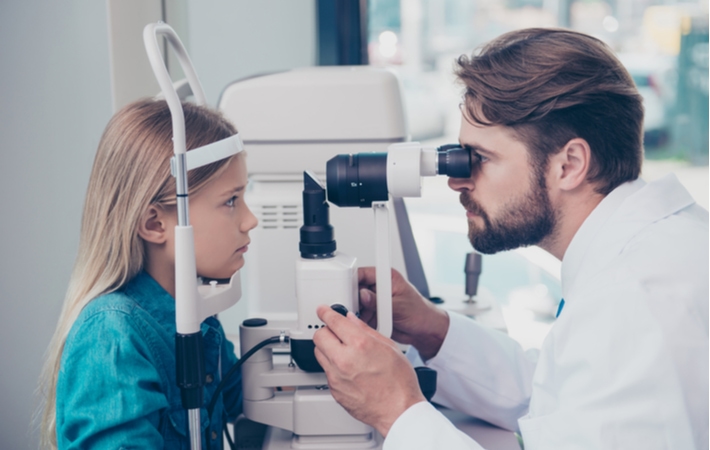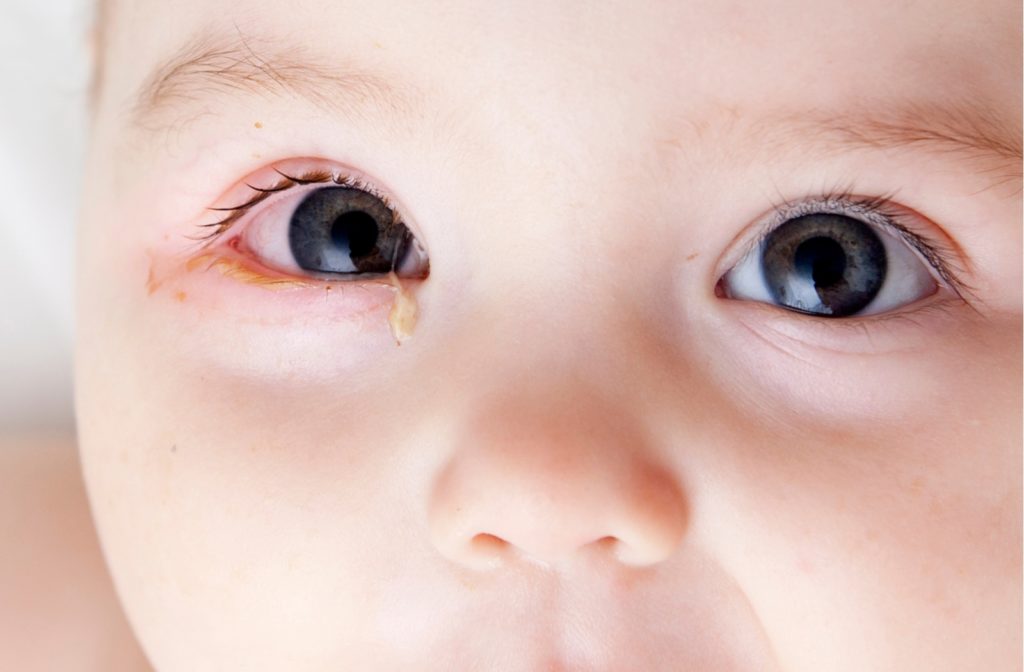Who You Gonna Call About Pink Eye?
Pink eye can be an irritating eye condition, and some types are highly contagious. So when you notice eye redness in the whites of your eyes, it’s time for a professional to take a closer look.
Conjunctivitis (pink eye) is easily spread, and you should book an eye exam as soon as possible. You might consider calling your family doctor first, but there’s another type of doctor that can help: your eye doctor.
Next time you need a closer look at eye health, contact Discover Eyecare.
What Causes Pink Eye?
Conjunctivitis, more famously known as pink eye, is an inflammation of the conjunctiva. The conjunctiva is a transparent, thin layer that covers the eye’s front surface and the inner eyelids. The conjunctiva might be thin, but it’s continuous, and it’s the reason contact lenses can’t slip behind your eye. It’s a barrier protecting your eyes from dust and debris.
The conjunctiva is a handy layer for eye protection. However, there can be problems that affect conjunctiva function, with pink eye being one of the most common.
There are 3 main types of conjunctivitis:
- Infectious
- Chemical
- Allergic
Infectious conjunctivitis is highly contagious and can be caused by viruses or bacteria. Seeking treatment from an optometrist or doctor is recommended to protect your eyes and prevent the infection from spreading.
Chemical and allergic conjunctivitis isn’t contagious. Instead, it’s caused by chemical exposure or allergens. Some examples of chemical exposure include cleaning products, smoke, and fumes. Examples of allergies include pollen, dander, or dust mites.
Chemical or allergic conjunctivitis is typically resolved by changing your environment—for example, flushing chemicals from your eyes or avoiding an area known to have allergens. However, if the irritant is unknown or unavoidable, treatment is available.
The 3 types of conjunctivitis can exhibit similar symptoms, so it’s crucial to schedule an eye exam. Your optometrists can diagnose pink eye and help you identify the type.
The most common symptoms of pink eye are:
- Pink (or red) eyes
- Inflamed inner eyelids
- Watery eyes
- Blurred vision
- Scratchy or gritty eyes
- Pus or watery discharge
- Stringy white mucus
- Irritated or itchy eyes

Can Your Optometrist Diagnose Pink Eye?
Yes! Your optometrist can diagnose pink eye.
Optometrists are experts on many eye conditions and diseases, from the common to the rare. Although pink eye is common, it’s also easy for patients to mistake it for simple eye redness or irritation. We can evaluate the health of eye tissues to better understand eye function and health, including detecting the reason behind your pink eyes.
An optometrist can diagnose whether your pink eye is infectious, chemical, or allergic. Then, we can work with you to treat the eye condition or develop a plan for preventing pink eye. For example, suppose it’s bacterial conjunctivitis. In that case, we can prescribe antibacterial eye drops or develop a personalized plan for better eye hygiene.
Treatment for Pink Eye
The treatment for conjunctivitis depends on which type is causing the inflammation.
Viral Conjunctivitis
Viral causes of pink eye tend to be mild and often clear up within 7–14 days. However, viral conjunctivitis can last between 2–3 weeks. During that time, patients can spread the infection and increase the risk of eye damage.
Antiviral medication may be necessary to treat more severe infections, such as viral conjunctivitis caused by herpes simplex virus or varicella-zoster virus (chickenpox). However, your body’s immune system is essential for fighting viral infections.
An optometrist can offer options to help manage symptoms, including artificial tears, warm compresses, antihistamine eye drops, or steroid eye drops.
Bacterial Conjunctivitis
Pink eye caused by bacteria can improve in 2–5 days but typically takes 2 weeks to go away completely. Treatment can shorten the infection duration, reduce the risk of eye complications, and decrease the spread. Your optometrist can prescribe antibiotic eye drops or ointment.
Some bacterial infectious known to cause pink eye include:
Chemical Conjunctivitis
Chemical conjunctivitis occurs when our eyes come into contact with a chemical irritant. However, it can sometimes be challenging to know what caused the reaction as we experience individual reactions. For example, some people have a minimal response to chlorinated pools. In contrast, others need goggles to prevent inflamed or stinging eyes.
Some chemical irritants can be easily pinpointed, such as standing too close to smoke or fumes. If you’ve recently used cleaning products, perfume, or sprays and then feel eye irritation or notice eye redness, it’s because chemicals have caused eye inflammation. Flushing your eyes can remove some chemical irritants, but it’s still crucial to have your eyes assessed.
If chemicals are splashed into your eyes, you need emergency eye care. Contact us at Discover Eyecare for an emergency appointment or go immediately to emergency care.
For distanced chemical exposure, you may need over-the-counter or prescription eye drops to help clear your eyes and alleviate discomfort.
Allergic Conjunctivitis
Allergic conjunctivitis is an allergic reaction and typically improves when the allergen is removed. However, it can be challenging to eliminate some allergens. For example, people with a pollen allergy can experience symptoms outdoors or indoors, as pollen easily spreads.
For patients with seasonal allergies, over-the-counter antihistamine medications may help. However, suppose a patient frequently experiences allergic conjunctivitis but doesn’t know the cause. In that case, it may be necessary to book an appointment with an allergist. Knowing what you’re allergic to makes it easier to avoid the allergen and consider more options for treatment.
Although home remedies can’t cure allergic conjunctivitis, they can help manage symptoms and improve comfort. Some options for at-home care include:
- Placing an ice-cold, clean cloth over closed eyes
- Artificial tears (eye drops)
- Gently flushing eyes to remove irritants
Optometrists can also recommend prescription medications for severe eye allergies. Antihistamines are available as oral or eye drops, over-the-counter or prescribed. Talk to your optometrist if you experience increased eye discomfort. We can discuss the best options for your eye health.
Contact Us to Diagnose Your Eye Health
We can diagnose your eye health! Whether you’re experiencing pink eye or other eye conditions, our eye care team can help. From diagnosis to treatment, we’re committed to your eyesight. Book an appointment with Discover Eyecare today!



